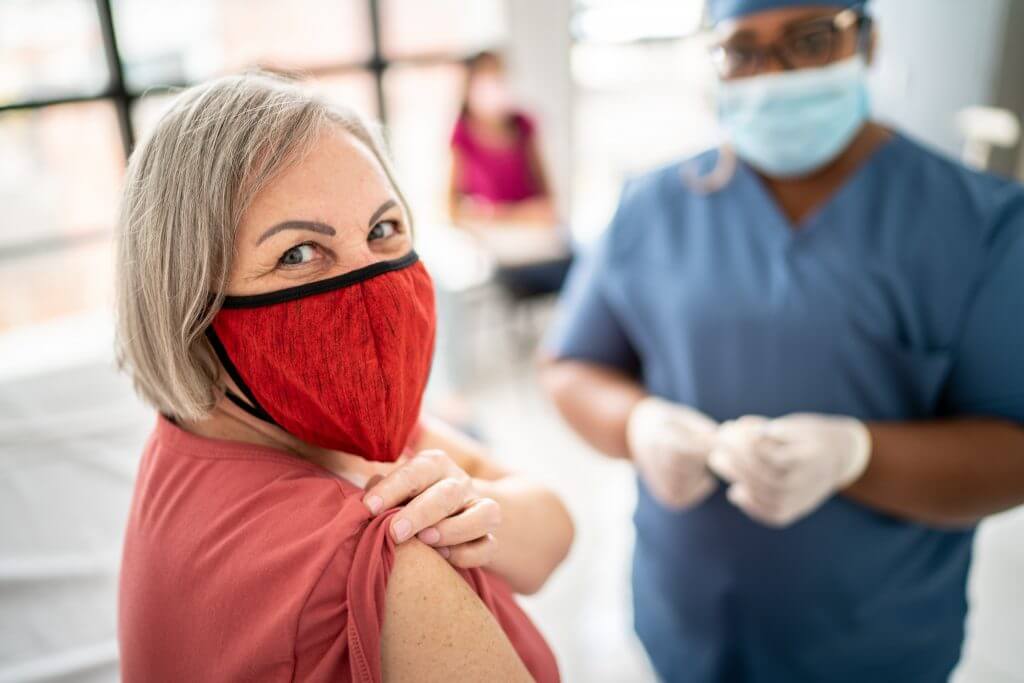The vaccines adults need beyond COVID-19 and the flu shot
Most American adults are missing out on essential vaccines. Find out if you’re among them, and how to catch up — so you can protect your health.

Once you hit your adult years, you probably don’t think too much about vaccines. But you should: Many American adults aren’t up to date on their shots, according to the Centers for Disease Control and Prevention (CDC). Less than 66% of all adults are up to date on their tetanus shot, for example. Only about 40% of us get an annual flu shot. And as of July 3, 2021, less than half of Americans were fully vaccinated against COVID-19. But if the COVID-19 pandemic has taught us anything, it’s that vaccines are important, even lifesaving. Here’s a look at the vaccines you need — and when.
3 Vaccines Every Adult Needs
1. DTaP vaccine
DTaP stands for diphtheria, tetanus, and pertussis (whooping cough). You should get this vaccine as a preteen — ideally at age 11 or 12. Adults who didn’t have it then should get a dose of DTaP now, plus a Td (tetanus, diphtheria) booster shot every 10 years. Women also need the DTaP vaccine every time they become pregnant, between 27 and 36 weeks. That will protect their newborns from whooping cough, which is very dangerous for babies. For the same reason, experts recommend that anyone who will be around a baby makes sure they are up to date on their DTaP vaccine.
2. The flu shot
All adults need a seasonal flu (influenza) vaccine every year. The flu vaccine is very important for people with chronic health conditions, pregnant women, and older adults. People in these groups are more likely to get seriously ill from the flu.
The vaccine cuts your risk of getting the flu by 40% to 60%. And even if you do get the flu, you’re much less likely to become very sick, says Michael Hochman, MD. He’s the CEO of the SCAN Homeless Medical Group Initiative and host of the Healthy Skeptic, MD podcast.
If you are over the age of 65, you should get 1 of the 2 flu vaccines that are designed for your age group: Fluad or Fluzone High-Dose. They provide more protection for older adults than a regular flu shot.
3. The COVID-19 vaccine
If you haven’t yet had your COVID-19 shot(s) and you’re age 12 or older, the CDC recommends that you get vaccinated right away. People ages 12 and up can get the Pfizer-BioNTech vaccine, which is 2 shots 3 weeks apart. The Moderna and Johnson & Johnson/Janssen vaccines can be given to anyone 18 or older. Moderna is 2 shots, 4 weeks apart; Johnson & Johnson is 1 shot. All 3 are safe and effective at lowering your risk of COVID-19 and serious illness.
Interested in receiving additional tips and insights on managing your conditions, healthy living, and getting the most out of your benefits? Click here to sign up for our free newsletter.
7 Other Vaccines You Might Need
1. Shingles
If you are 50 or older, the CDC recommends getting this shot. Shingles is a blistering, painful rash caused by the varicella zoster virus. That’s the same virus that causes chickenpox. “The virus stays silently in your body and can reactivate years later,” says Dr. Hochman.
A new shingles vaccine, Shingrix, became available in 2018. It’s more than 90% effective at preventing shingles, according to the CDC. You get 2 doses, spaced 2 to 6 months apart. You should get it even if you’ve already had shingles. You should also get it even if you’ve already received the older shingles vaccine, Zostavax.
2. HPV
If you’re 26 or younger, you should get this vaccine. It protects against certain types of human papillomavirus (HPV). HPV is a common sexually transmitted virus. It causes most cervical and anal cancers, as well as other cancers and genital warts.
If you’re older than 26 and have multiple sexual partners, it’s worth speaking to your doctor about the HPV vaccine, says Alaina Brinley Rajagopal, MD, PhD. Dr. Rajagopal is an emergency medicine physician in Los Angeles and host of The Emergency Docs podcast. You may still benefit from the vaccine, “although many people in this age group have already been exposed to HPV,” says Dr. Rajagopal. The vaccine is usually given in 3 doses over a 6-month period.
3. Meningococcal
Everyone should have 1 of these tests beginning at age 45. If it’s normal, you can repeat it every 3 years. But start earlier and/or have testing done more often if you have risk factors for diabetes. Those include being overweight, There are 2 vaccines: the MenACWY vaccine and the MenB vaccine. They protect against meningococcal disease. It’s a rare but serious infection of the tissue that lines the brain and spinal cord. People ages 16 to 23 are at the highest risk. Both vaccines are generally given during the preteen and teen years. But if you’ve never had the vaccine and you’re a college student who’s going to be living in a dorm, you’ll need it, stresses Dr. Rajagopal.
4. Pneumococcal vaccines
These vaccines — PPSV23 and PCV13 — help protect against the bacterium that can cause pneumonia and meningitis. These infections can be very harmful to young children and older adults. That’s why vaccination is recommended for all children younger than 2 years old, and all adults ages 65 and older. Which vaccine you get depends on your age and whether you have certain medical conditions. Older adults may be advised to get both, at least a year apart.
5. Hepatitis A and B vaccines
Hepatitis A, B, and C are liver infections caused by 3 different viruses:
• Hepatitis A is spread when you ingest the virus. That can be through close contact with an infected person. Or it can be through eating or drinking something that is contaminated with the virus.
• Hepatitis B is spread through sexual contact or direct contact with the blood of an infected person.
• Hepatitis C is spread through contact with the blood of an infected person and sometimes through sexual contact, though it’s rare.
There are vaccines for the A and B types. There is no vaccine for type C. If you did not get the vaccines in childhood, you should get them now. That’s especially true if you have certain risk factors, such as using intravenous drugs or being a man who has sex with other men, says Dr. Rajagopal. There’s a combo vaccine approved for adults that protects you from both A and B types of hepatitis. It’s usually given as 3 separate doses over a 6-month period.
6. MMR
This vaccine protects you against measles, mumps, and rubella. It’s recommended for anyone born after 1957. (Before then, just about everyone got these diseases in childhood.) Most of us got vaccinated in childhood, but if you got your shot before 1968, talk to your doctor. You may have gotten a type of vaccine known as a “killed measles vaccine,” which didn’t work. If you and your doctor aren’t sure, you should just get another shot. It’s not harmful.
7. Varicella (chickenpox) vaccine
Chickenpox spreads easily. That’s why many public schools and daycares in the United States require students to be vaccinated. It’s recommended that kids under age 13 get 2 doses, the first at age 12 to 15 months, and the second between ages 4 and 6. If you’re over age 12 and you’ve never had chickenpox, never were vaccinated, or have received only 1 dose, you should get this vaccine. It’s spaced as 2 doses, 28 days apart.
How to Keep Your Vaccine Records Up to Date
Your vaccination (or immunization) record provides a history of all the vaccines you got as a child and adult. You may need this occasionally, especially if you travel outside of the United States. (The CDC has a list of the vaccines you might need if you’re traveling out of the country.) There is no national database that tells you which vaccines you got and when. But your doctor may have an up-to-date vaccine history in your medical records. Your state health department may also have registries that include adult vaccines. The CDC has a listing of registry contacts and websites.
A digital health management app like Wellframe can make it easy to keep track of your vaccines, as well as provide reminders for when you are due for shots. You can also use the app’s chat feature to send a secure message to a member of your health team to find out which shots you need and when. Then you can set health reminders to let you know when it’s time to schedule them. Digital health management tools like Wellframe are offered for free by many health plans and employers.
Staying on top of your vaccines doesn’t have to be hard, and it should be a priority for staying healthy.
Contact your health plan to see if you’re eligible for Wellframe.
